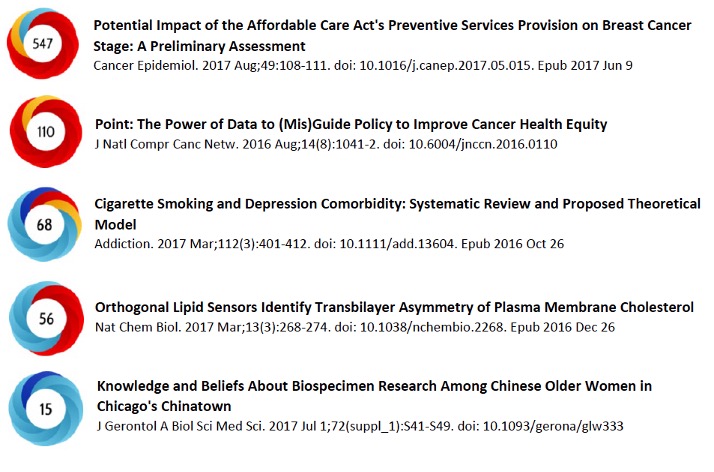ChicagoCHEC continues to impact Chicago Communities, Research and Trainees in meaningful ways.
BROAD IMPACT
Since inception in 2015, ChicagoCHEC has been a key player in advancing cancer health equity at the local and national level. ChicagoCHEC works with over 20 Community Partners in and around Chicago, has directly engaged 65 undergraduate and post-baccalaureate students to become involved in cancer research via the ChicagoCHEC Research Fellows Program and the LEaP program and continues to work with many trainees as a part of the ChicagoCHEC Incubator & Catalyst Grant Program and other programming. To date, ChicagoCHEC consists of approximately 90 direct members who are involved in either research, training or community outreach and development.
Expansion of the ChicagoCHEC Research Portfolio and Training Recently, our work has expanded to include the LGBTQ community and an exciting opportunity to understand lung cancer disparities in Cuba. In the Spring of 2017, we expanded our research program to include two more research projects – one focused on Breast Cancer Disparities and one focused on Engaging Citizen Scientists as a means to improve Prostate Cancer Screening.
Below is a snapshot of our publications in our current research areas
To see the latest list of ChicagoCHEC related publications visit our publications page
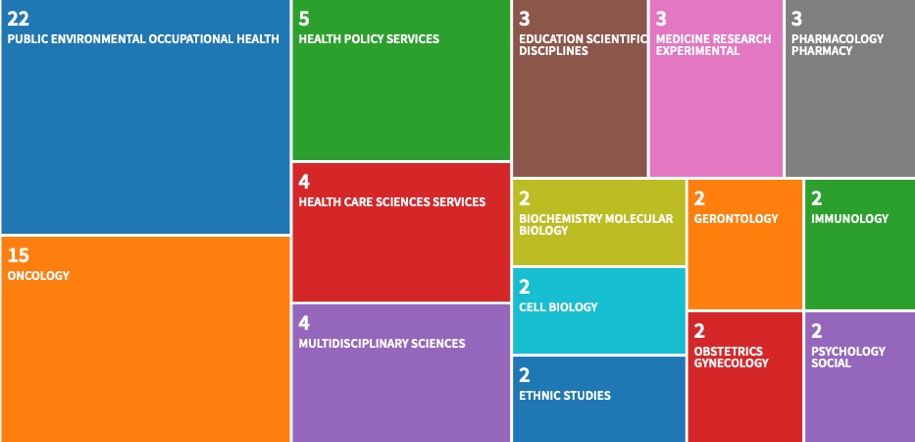
COMMUNITY HIGHLIGHTS
Our 2017 Community Forum, Community County: It Takes a Village to Defeat Cancer was our largest community event to date! The event came to a close with Keynote Speaker, Colon Cancer Survivor, and Blue Hat Foundation Founder, Candace Henley’s powerful words on screening, health access, and having a network for support!
CECIL the Inflatable Colon takes on Chicago! Our walk through, educational colon teaches individuals about colorectal cancer, screening, and the biology of disease! To date, ChicagoCHEC CHE’s have taken over 100 community members on an educational tour of CECIL, increasing knowledge, awareness, and empowerment!
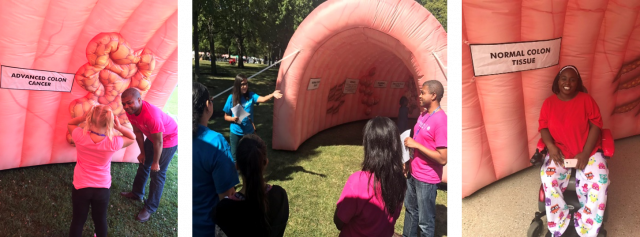
In our annual community reports, we highlight a few of our key accomplishments across the three core areas of ChicagoCHEC: community engagement, high-quality research, and education and training. These reports were presented to the public in-person at our annual Community Forum, and are available online.
STUDENT & TRAINEE HIGHLIGHTS (2019)
In the Summer of 2019, 17 students (and 3 returning Senior Research Fellows) from Northeastern Illinois University, Northwestern University, University of Illinois at Chicago, and the City Colleges of Chicago came together to participate as ChicagoCHEC Research Fellows in an 8-week, research and science intensive program in preparation for a career in health! (To apply to be the 2021 ChicagoCHEC Research Fellows, check back in December 2020)
Also in the summer of 2019, we lauched our Laboratory Experiences and Programs (LEaP) component. LEaP provides a continuation of training expereince in health disparaties and cancer to former CHEC Fellows. Visit the LEaP program page to learn more.
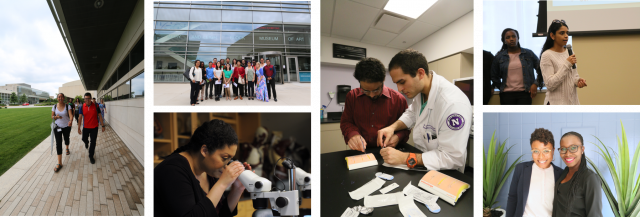
INCUBATOR & CATALYST GRANT TEAM HIGHLIGHTS (2015-2020)
It is imperative to spotlight the many contributions and main areas of impact from our ChicagoCHEC Incubator & Catalyst Grantees
- Choose to Change (Community Partner: Alliance of Chicago & the IL Tobacco Quitline) – The Choose to Change Team has been pivotal in the integration of an important referral component into the Electronic Health Records for low-income smokers. They are 1 of 11 state teams to achieve such a build and the ONLY to have done this within Federally Qualified Health Centers!
- MiGuia (Community Partner: ALAS-WINGS) – The MiGuia Team has developed one of the first tailored smartphone applications for Hispanic Breast Cancer Survivors in an effort to reduce cancer-related symptom burden and improve quality of life!
- WeCanConnect (Community Partner: Access Living) – The WeCanConnect team has developed and launched ScreenABLE Saturdays, a health fair event specifically for women with disabilities. Due to ScreenABLE Saturdays, women with disabilities are getting FREE ACCESSIBLE mammograms – many for the first time in their lives!
- Prostate Cancer Disparities on the South Side (Community Partner: Project Brotherhood) – The Prostate Cancer team has proved cross-site collaboration and training are imperative as the team better understands how prostate cancer cells affect organoid cultures in African American patients, making significant progress in optimization techniques!
- Reducing Colorectal Cancer Disparities (Community Partner: ACCESS Community Health Network) – The Colorectal Team is making important community linkages that will aid in understanding colorectal cancer screening, incidence and prevalence among African American men on the South and West side of Chicago!
- Obesity Intervention in Latinos (Community Partner: Puerto Rican Cultural Center) – The Obesity Intervention Team has made a indelible mark on Chicago’s Hispanic neighborhoods, providing continuous community outreach, programming and support for Hispanic men!
- Engaging Citizen Scientists (Community Partner: Project Brotherhood) – More to come soon – this team is just getting started on exciting research efforts.
- Molecular Approaches to Breast Cancer Disparities (Community Partner: Mercy Hospital & Medical Center) – More to come soon – this team is just getting started on exciting research efforts.
CHICAGOCHEC RESEARCH METRICS
ChicagoCHEC has directly supported the publication of over 100 manuscripts, the creation of nearly 20 non-traditional research products (infographics, brochures) and have disseminated research efforts through contemporary means such as Skinny Trees, a podcast focused on Health Inequities and Cafe, Salud y Vida, a Spanish Public Radio Show that discusses various health topics, hosted by ChicagoCHEC Community Health Educator, Dr. Elena Navas.
Below is a snapshot of our publication themes from 2015-2020!
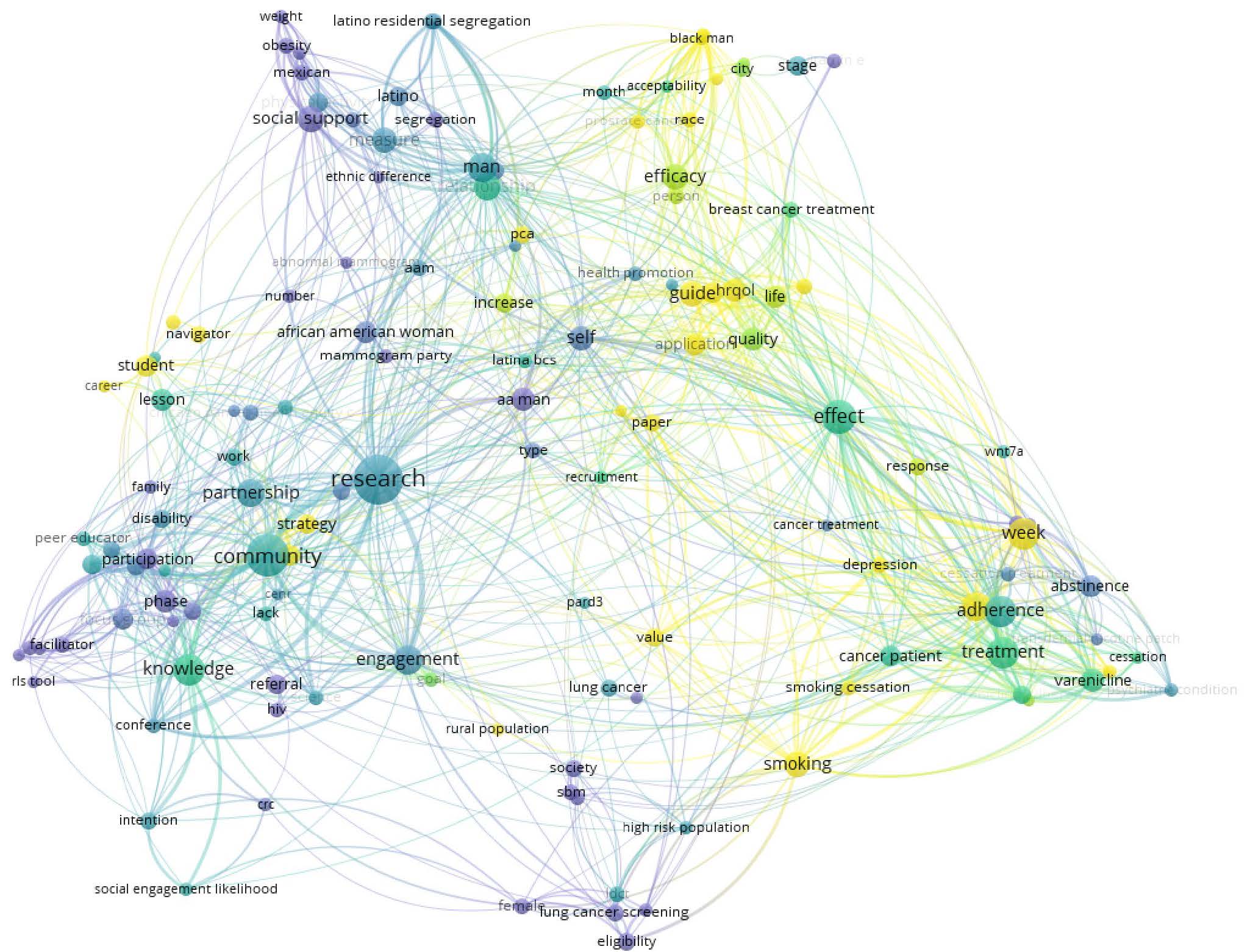

Term bubbles are sized by the number of times they occur in the title or abstract of the publication: the larger the term the more the occurrences. Each term occurs in at least 2 publications.
The terms are colored by their normalized citation impact score. A score of 1.0 indicates the article has as many citations as the global expected citations. Anything below 1.0 means the article has fewer citations than the global average, anything above 1.0 means the article has more citations than the global average.
Journal Impact Factor
The traditional mode of communicating scholarly information is through the publication of a journal article. In this mode, journals often take on many of the dissemination activities, gaining popularity and trust from scientific audiences through their overall prestige, quality of peer review, or timeliness of publication. The Journal Impact Factor, a metric from Clarivate Analytics Journal Citation Report, provides insight on how often documents published in the last two years are cited in the most current year. The faculty have published in 41 journals that have Journal Impact Factors. These are rated in quartiles with Q1 having the highest impact factor.
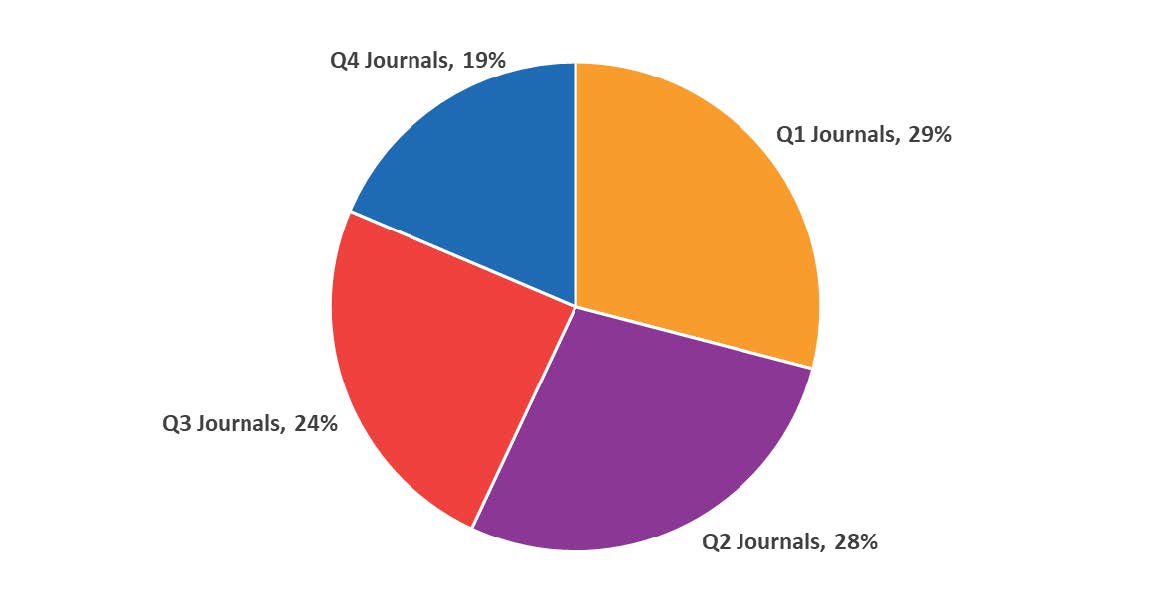
49% of Chicago CHEC direct documents rank in the 50th percentile or above for citation impact in their respective subject areas. (42 out of 87 documents indexed in Web of Science/InCites have a percentile rank <=1.0 to 50 using a flipped percentile scale)
ChicagoCHEC has published 107 directly-related documents from 2015 – June 2020, of which there were 94 indexed in the Scopus, and 92 indexed in the InCites (Web of Science). These documents have cumulatively generated over 521 citations reported by Scopus and 396 citations reported by InCites.
Citing Authors
Tracking the country’s affiliations of citing authors provides tangible information on how research has disseminated in the scholarly community. The citing authors represented 124 countries including the United States. The chart below represents the global dissemination of the faculty’s publications, and their influence on an international audience.
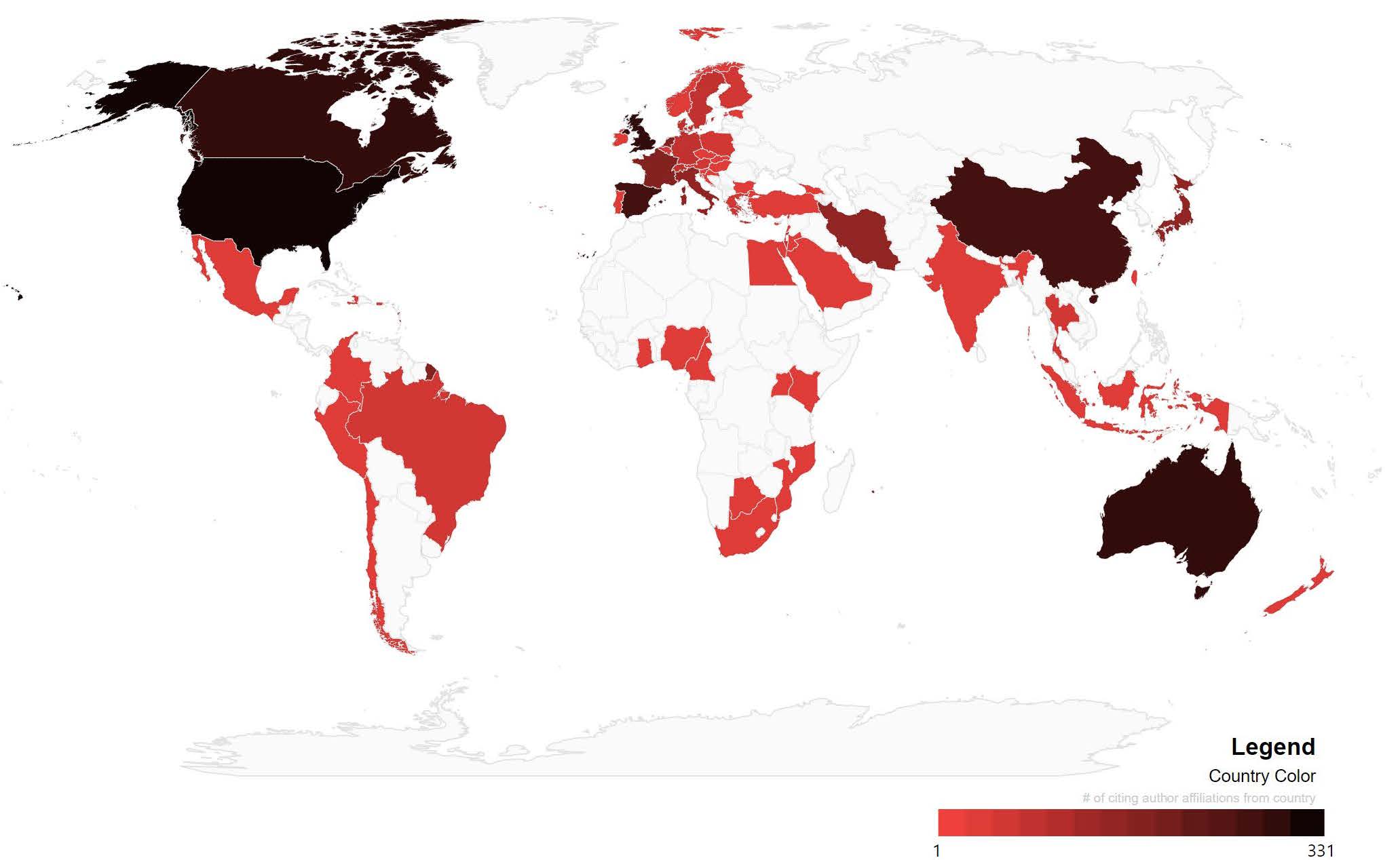
Global Influence. The 94 ChicagoCHEC publications were cited 521 times in the same time period. Each country is color-coded in proportion to the number of author affiliations from that country on citing documents. Minimum and Maximum values are provided in the legend.
Alternative Metrics: online attention
Altmetrics are data that can explain both the volume and nature of attention that research receives online. Altmetrics measure the overall reach of and engagement with social media and showcase the volume of attention that the research has received.
ChicagoCHEC Publications with most Altmetric attention
